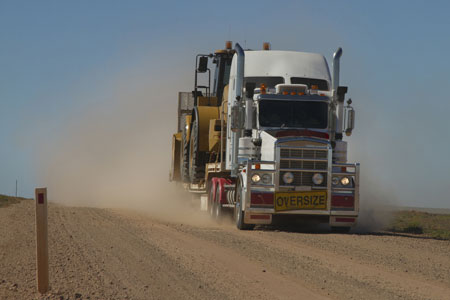 The EPA has noted that fugitive dust has numerous and devastating consequences. Health of humans and animals can be adversely affected by uncontrolled dust conditions. Stream quality can be compromised, resulting in potential harm to aquatic life. Health of plant life, particularly near farms, is affected by fugitive dust. Additionally, dust contributes to erosion of road surfaces. Degradation of these surfaces means increased maintenance costs, unsafe travel, and higher costs to tax payers to fix these roads. Studies have demonstrated that fugitive dust on roads can reduce visibility up to 40%, creating unsafe driving conditions. Equipment maintenance is increased and equipment life decreased when used in dusty environments. Maintaining a vehicle that drives an average of 40 mph exclusively on dirt and gravel roads, costs 40% more than maintaining the same speed on paved roads.
The EPA has noted that fugitive dust has numerous and devastating consequences. Health of humans and animals can be adversely affected by uncontrolled dust conditions. Stream quality can be compromised, resulting in potential harm to aquatic life. Health of plant life, particularly near farms, is affected by fugitive dust. Additionally, dust contributes to erosion of road surfaces. Degradation of these surfaces means increased maintenance costs, unsafe travel, and higher costs to tax payers to fix these roads. Studies have demonstrated that fugitive dust on roads can reduce visibility up to 40%, creating unsafe driving conditions. Equipment maintenance is increased and equipment life decreased when used in dusty environments. Maintaining a vehicle that drives an average of 40 mph exclusively on dirt and gravel roads, costs 40% more than maintaining the same speed on paved roads.
Successful ULTRA Bond™ treatment can significantly reduce dust conditions and help preserve road surfaces. Various studies show that control measures can reduce dust by 30% to 80% and cut aggregate loss by 25% to 75%. Such treatments, however, will not last forever, and repeated applications may be necessary. We must view dust control as a necessary routine maintenance item for all unpaved roads – not only to prolong road life, but also to protect the environment. Dust control means that the roads will stay intact; the fines will remain interlocked with the larger aggregates and keep everything in place. Similar to the cut in aggregate loss, studies report that one can expect a 25% to 75% cost reduction in blading, regrading, and re-graveling by implementing a dust control program. As testament to the seriousness of the problem, some states have funding sources available for dust suppression. Check your local and state agencies for possible funding to aid in purchasing ULTRA Bond™ to solve your road dust problems. Pennsylvania has funds available to Townships through the Dirt and Gravel Roads Program and the Liquid Fuels Program.

